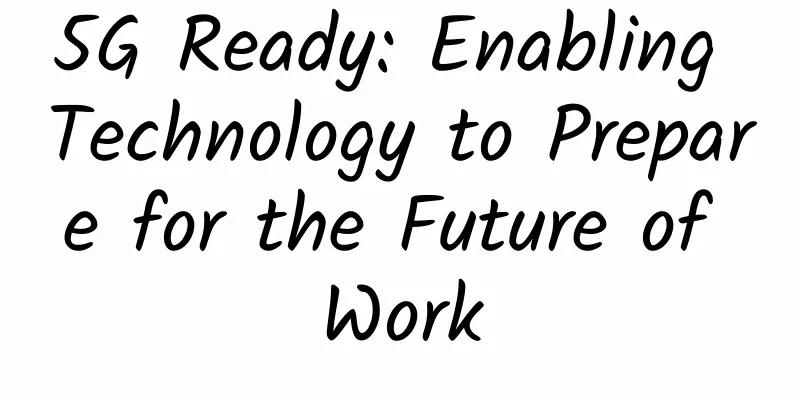5G Ready: Enabling Technology to Prepare for the Future of Work

|
5G opens the door to major technological advances that will require higher speeds and increased capacity to support them. This will not only impact our personal lives through technologies such as wearables, but also the business environment through smart transportation, smart cities and better ways of working. Conversations around 5G often mention Internet of Things (IoT) applications, such as fast connectivity for smart appliances and consumer devices. However, the rapid deployment of this powerful network can also bring a range of new economic opportunities to businesses. In this regard, 5G can drive employee engagement and productivity in a number of ways: Reliability: 5G is expected to be more reliable than its predecessor, meaning it will be protected from technical issues such as dropped calls or loss of network connectivity. As businesses become increasingly reliant on uninterrupted networks to provide vital services to customers and the public, always-on networks will support more “critical” use cases. Flexibility: Network slicing will allow the physical network to be divided into multiple virtual networks, enabling users to use the right "slice" according to their needs, essentially creating their own network. This means that enterprises can prioritize traffic while ensuring the security of the network. Greater capacity: 5G networks will be better able to support high-capacity applications so that data-intensive enterprises and hyperscalers can support their workloads through the cloud or through data center storage, allowing them to scale at will. The importance of digital infrastructure 5G will be significantly faster than 4G and have much lower latency, meaning there will be little to no delay when connecting devices using the mobile network. These capabilities are expected to significantly change the end-user experience and introduce new digital realities with minimal disruption. A strong 5G infrastructure is essential to facilitate advanced and next-generation technologies such as connected cars and smart cities, while also bringing opportunities to businesses. As the amount of data from external transactions, internal processes, smart monitoring and AI analysis grows rapidly in modern enterprises, 5G will become the go-to service required to ensure data is quickly transmitted and processed for smooth operations. However, the 5G technology that powers these processes will rely on a strong digital infrastructure provided by telecommunications organizations. Close collaboration between local governments and third-party innovators will also be key to helping 5G become a reality, and the collaboration between them will be carried out through high-speed, full-fiber connections. Evolving workplace culture If 5G delivers on all it promises, many expect it to support the Fourth Industrial Revolution, in which everything is connected, processed and digitized. So what do these enhanced capabilities actually mean for the workplace? 5G will become a key driver of business decisions in the near future, enabling companies to expand their employee searches to locations that may have previously been considered too remote. Talent pools can now be opened up to a global scale, and improved connectivity will ensure that complex remote working is not only possible, but effortless. As work from anywhere (WFA) continues to be an effective way of working, and as companies move storage to the edge to accommodate the long-term shift in work culture, enterprises will want to gain 5G connectivity to ensure data can be stored and processed efficiently in the cloud or data center. The COVID-19 pandemic has served as a great testing ground for the future of work, as most companies have worked out the initial teething problems. Now that it looks like remote working will become a more permanent change for many people, businesses will want to adjust their models accordingly — and 5G will help accommodate that process. Prepare for the future of work 5G will have a lasting impact on the workforce in many ways. But most notably, it will help democratize job opportunities and better empower frontline workers, who are often excluded from corporate culture. For most industries, 5G will pave the way for more efficient collaborative work, regardless of geography, while providing technological enhancements such as lower latency and more consistent reliability, improving productivity and increasing revenue. As we approach the future of work, 5G will be a milestone in empowering digital workers and businesses alike. |
<<: The latest analysis of WiFi 6E and WiFi 7 market!
>>: How does the computing power network work?
Recommend
Wireless Broadband Alliance: 5G should not be viewed in a narrow sense and can coexist harmoniously with Wi-Fi 6
Tiago Rodrigues, who took over as CEO of the Wire...
ZJI: 30% off on Huawei/Kwaiwan dual-line servers in Hong Kong, special Huawei models in Hong Kong with a monthly discount of 300 yuan and starting at only 450 yuan/month
This year's New Year came earlier. After New ...
UWB technology is so popular, but which application areas are most worthy of attention?
In the past one or two years, UWB technology has ...
Mobile Data and Broadband Outlook 2017: Consumers Expect More Inclusive Data Plans
According to foreign media reports, as an industr...
The world's first Android-enabled smart network tester is launched, and NETSCOUT shares the innovation story behind it
[51CTO.com original article] The most tense and e...
TCP three-way handshake and four-way wave
TCP (Transmission Control Protocol) is a connecti...
U.S. Department of Commerce: Will allow U.S. companies to work with Huawei to develop 5G network standards
[[330263]] In the early morning of June 16th, Bei...
IEEE: Artificial intelligence, 5G, and the Internet of Things will be important technologies in 2021
On November 26, foreign media reported that accor...
MWC2023: Huawei releases a series of innovative solutions for simplified networks and data centers to accelerate the transition to an intelligent world
[Barcelona, Spain, February 28, 2023 ] During t...
F5 is committed to being a "general practitioner" protecting hospital applications by taking a two-pronged approach of safety and reliability
At a time when all walks of life are experiencing...
As containers become more widely used, how should we monitor them?
With the booming development and implementation o...
Many operators have been arrested! Please stay away from these common illegal operations.
Starting from the second half of 2020, the nation...
Ministry of Industry and Information Technology: 5G users account for more than 30% of my country's total
On October 26, the Ministry of Industry and Infor...
Four key concepts you need to know about AI
[51CTO.com Quick Translation] AI (artificial inte...
Tencent Cloud Light 1C2G3M annual payment 83 yuan, Hong Kong Light 1C1G30M annual payment 298 yuan, new and old users are welcome
Tencent Cloud's Double Eleven event is still ...









